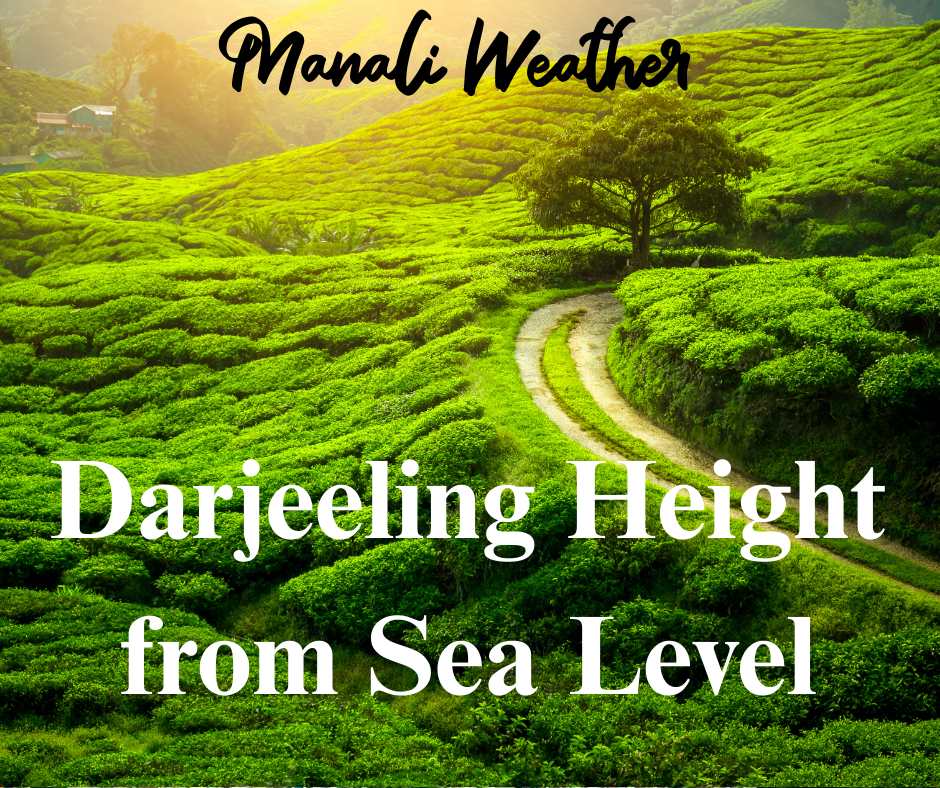Darjeeling Height from Sea Level

Darjeeling Height from Sea Level & Darjeeling Elevation — Tea Gardens & Himalayan Views
A traveller’s guide to Darjeeling height from sea level, how Darjeeling elevation shapes climate and views, and practical tips for visiting the Queen of the Hills.

Darjeeling Height from Sea Level — the headline number
Darjeeling town sits high in the Lesser Himalayas. The commonly cited average Darjeeling Height from Sea Level is about 2,045 metres (≈ 6,709 ft) above sea level, which gives the town its cool climate, tea-growing slopes and those unforgettable mountain sunrises. While local spots vary (some ridges and viewpoints are higher), this figure is a useful baseline for travellers and weather planning.
Quick elevation facts
| Place / Metric | Approx. Elevation | Notes |
|---|---|---|
| Darjeeling (town average) | ≈ 2,045 m / 6,709 ft | Commonly used town elevation for guides & weather. |
| Observatory Hill / Mall area | ≈ 2,134 m / 7,000 ft | Central tourist hub with clear views on good days. |
| Tiger Hill (sunrise viewpoint) | ≈ 2,573–2,590 m / 8,417–8,482 ft | Highest nearby viewpoint — famous for Kanchenjunga & Everest views. |
Why Darjeeling’s altitude matters
The Darjeeling Height from Sea Level is the reason the region supports premium tea plantations and a distinct mountain culture. Elevation affects temperature (cooler than the plains), cloud and mist patterns (often dramatic), and seasonal snow on nearby higher ridges. These factors combine to create the scenic tea terraces, crisp air and dramatic sunrises the area is famous for.
Elevation & climate — what visitors should expect
- Cool, pleasant summers: Daytime is mild compared to lowland heat, making Darjeeling a preferred summer escape.
- Misty monsoons: June–September brings heavy showers and mist that drapes tea gardens — beautiful but slippery underfoot.
- Clear autumns: October–November often yields crisp air and clear views of Kanchenjunga and other peaks.
- Cold winters: Nights can be cold; frost or light snow is possible on the highest nearby points.
Elevation vs experience — quick comparison
| Feature | Darjeeling (≈2,045 m) | Tiger Hill / High ridges (≈2,600 m) |
|---|---|---|
| Temperature | Mild days, cool nights | Noticeably colder; windier |
| Views | Excellent when skies clear | Panoramic Himalayan vistas including Kanchenjunga & Everest |
| Accessibility | Easy walking within town | Short drives or hikes required |
Darjeeling elevation — practical tips for travellers
Knowing the Darjeeling height from sea level helps you plan clothing, activities and sightseeing timing. Here are simple tips to make your trip comfortable:
- Pack layers: mornings and evenings are cool year-round; a light fleece plus a windproof layer works well.
- Carry waterproof footwear and a rain jacket in monsoon months — paths in tea gardens get slippery.
- For sunrise at Tiger Hill, leave early and bring a warm jacket — temperatures can be several degrees lower than town.
- Hydrate and take gentle walks to acclimatise — Darjeeling’s altitude is moderate but hill climbs can feel tiring after long road travel.
Darjeeling & nearby altitudes — cheat sheet
| Spot | Approx. Altitude | Why it matters |
|---|---|---|
| Darjeeling town | ~2,045 m | Tea estates, Mall & local markets |
| Observatory Hill / Chowrasta | ~2,134 m | Central ridge viewpoint; clear views when skies permit |
| Tiger Hill | ~2,573–2,590 m | Famous sunrise point with Himalayan panoramas |
| Happy Valley Tea Estate | ~2,000–2,100 m | Tea tours & factory visits near town |
Conclusion — altitude is part of the charm
The Darjeeling height from sea level (≈2,045 m) explains the region’s cool climate, tea terraces and mountain vistas. Whether you’re sipping Darjeeling tea in a garden, hunting sunrise at Tiger Hill, or strolling the Mall, the elevation is central to the experience. Plan layers, expect clouds and mist in the monsoon, and aim for clear-season mornings (Oct–Nov) for the best Himalayan views.








2 thoughts on “Darjeeling Height from Sea Level”